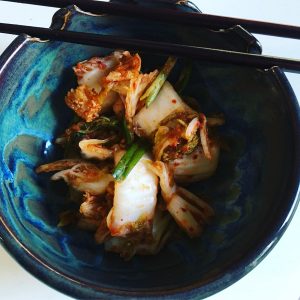Contact Us

photo credit: Tasha Burgoyne
When God formed my limbs, shaped my eyes and decided to give me my mother’s dark, thick hair, through her: he fed me kimchi.
Aside from being a non-negotiable side dish to every meal at our dinner table, kimchi accompanied the stories I grew up hearing. The first time my imagination held a picture of my mom as a girl, was when she told me about the time she climbed out of a window at night to sneak out and fell into a kimchi jar outside that was almost as big as she was. It was the kimchi that gave her away and told her secrets.
I have stood by my mom a million times watching her soak cabbage in sea salt and water, later covering the soaked and rinsed pieces with crushed red pepper and other secret ingredients, only to have her finally shove a fresh piece into mine or my sister’s mouth for approval and applause. I know the sounds her kimchi makes as it’s being shoved and crowded into big jars like people on the subway in Tokyo. My sister and I have seen her give kimchi the starring role in soups and fried rice and after-school snacks. It has been the object of comparison among my mom and other Korean women. “How was her kimchi?” she would ask, waiting for us to remind her that hers is indeed, better. My mom’s kimchi has always been requested by Koreans and non-Koreans alike. And I have always believed in the best, completely biased way, that hers is the very best there is.
Confession: kimchi has always been one thing that proved I was not Korean enough.
As a young girl I thought it was too spicy. To the utter dismay of my mother’s global palate, I was the world’s most finicky eater. My Caucasian half felt like a blinding light I couldn’t cover at meal time. My mom had to “wash” my kimchi for me so I could eat it without sweating like my meal was an Olympic sport. And on the occasion that she didn’t wash it, I drank cup after cup of water in-between eating a few tiny pieces, until my belly bulged with discomfort.
Even though she never said it, I wondered if she was sad that the Korean fire in my belly was constantly being put out by the gallons of water I drank to tame it.
After a number of years, I could eat kimchi without it being washed, but the feeling of not enough lingered. I only ate kimchi when my mom made it for me. So, whenever she and my Dad would visit, she would make a large batch to last me through a good number of cravings. When it would run out, I would think about making my own, only to decide against it. What if I couldn’t do it? Surely, something would go wrong and I would forget something major; the result would be the taste of the kind of kimchi you can buy at expensive organic grocery stores where the kimchi is void of stories and full of marketing.
Last Sunday, I made it all by myself, for the first time. And for the first time in my life, I am beginning to feel comfortable in my mixed shoes. I suppose I’ve realized that even though the shoes don’t match, they both fit: perfectly.
As I turned the cabbage pieces over, giving the drier ones a turn at soaking in the salty water, I did it without thinking. I had no recipe to keep pulling up on my phone, and no paper recipe nearby. The recipe was a life spent watching and listening to my mom. There was something therapeutic in getting my hands messy and watching the cabbage transform. I was making kimchi; the way my mom did. The white cabbage turned reddish orange as the crushed red pepper fell into place: the light and dark, the mild and feisty, the not enough and the too much, the mixing of it all turning it into one. My hands instinctively folded, chopped and mixed: wrapping stories and memories around the pieces, claiming the moment as marker.
The true stories are within me and I am enough. I am exactly the mix of what I should be: a girl made woman, making Kimchi, ready to pass the God-given tastes and stories onto my own children, as they search for and claim their identity.
This article was originally posted at tashajun.com.
 Tasha Burgoyne is a dreamer, a Hapa girl, wife to Matt and mama to three little warriors: two wild boys and one little lady. A coffee-drinker, story-lover and kimchi-eater, she was made to walk where cultures collide, from dirt roads to carefully placed cobblestone streets. Find more of her writing at tashajun.com.
Tasha Burgoyne is a dreamer, a Hapa girl, wife to Matt and mama to three little warriors: two wild boys and one little lady. A coffee-drinker, story-lover and kimchi-eater, she was made to walk where cultures collide, from dirt roads to carefully placed cobblestone streets. Find more of her writing at tashajun.com.
